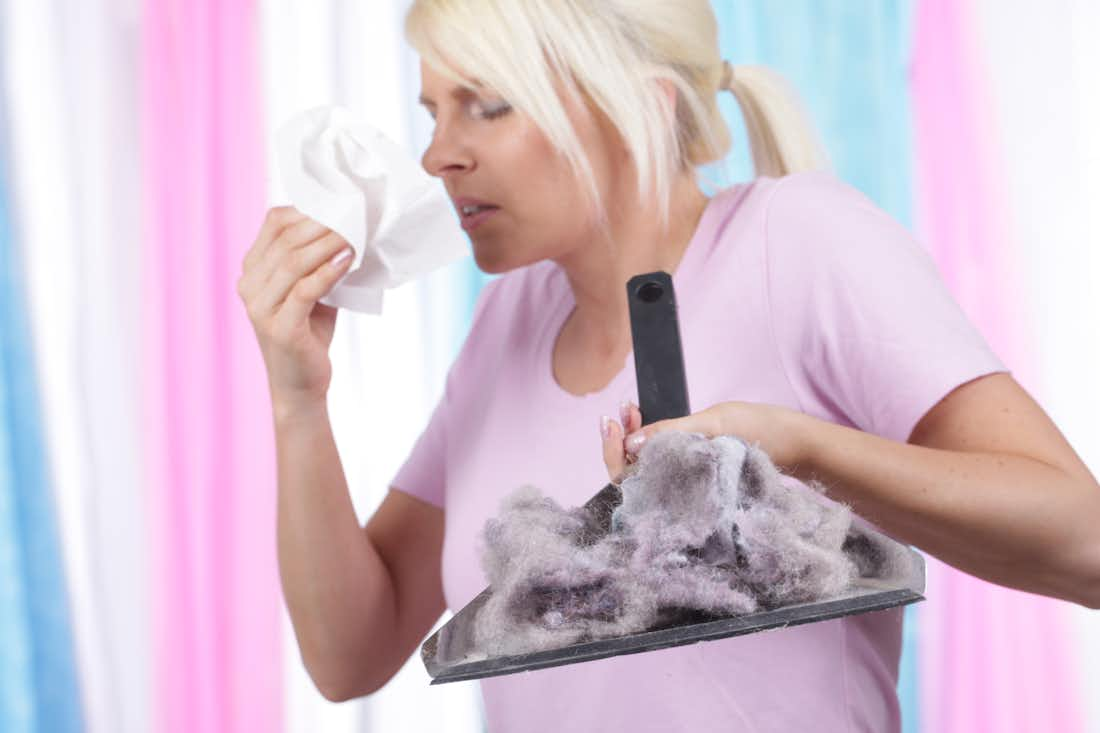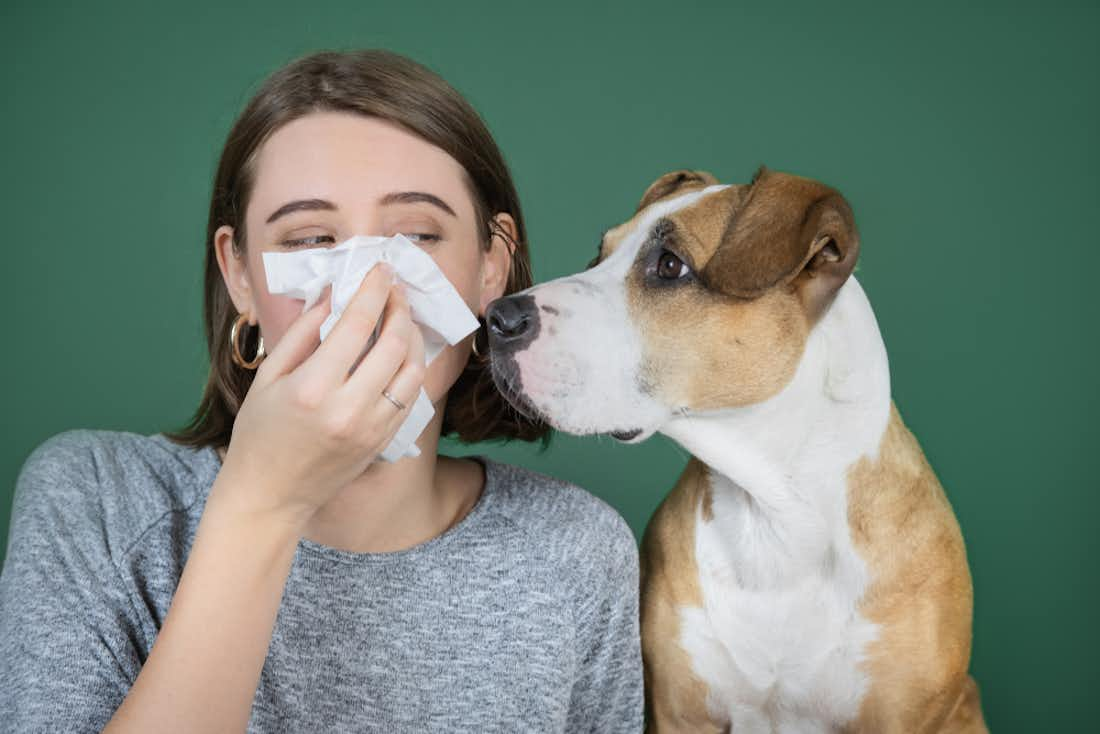Jun 14, 2022
Can Allergies Cause Sore Throat?
5 minute read
Your throat is used to swallow food, talk to friends, breathe fresh air, and sing beautiful songs. You use it for almost everything, so when it starts to feel sore and raspy, you take notice.
There are plenty of reasons why your throat might hurt, and allergies are definitely one of them — however, they aren’t the only possible cause. Let’s take a look at why allergies cause sore throat, what else may be to blame, and some home remedies that might bring you the relief you need.
Understanding Allergies
Your immune system does a good job of defending your body from foreign invaders like bacteria and viruses.
However, sometimes it does _too _good of a job. Some people’s immune systems are hypersensitive, and they wrongfully perceive harmless substances as harmful, such as pollen or dust mites.
Certain proteins in these substances cause an overreaction, producing antibodies called immunoglobulin E (IgE). These then travel to cells and release chemicals called histamines. Those chemicals instigate allergy symptoms like runny nose, cough, or itchy eyes.
There are a few different types of allergies. Some of the most common occur due to indoor and outdoor allergens during allergy season, such as mold, grass, ragweed pollen, and dust mites. These are airborne particles that can enter your body through the eyes, nose, and mouth. The symptoms of these allergies are typically related to the respiratory system, including congestion, itchy and scratchy throat, or wheezing.
Food allergies can occur if you have specific IgE antibodies for the proteins in certain foods. Milk, peanut, shellfish, and soy are among the most common food allergens, and symptoms are often seen on the skin in the form of hives or a rash. However, a reaction to these common allergens can also lead to difficulty breathing or swelling of the lips, tongue, and throat.
Finally, contact dermatitis occurs when certain allergens make contact with the skin. Cosmetics, medications, or cleaning solutions tend to be the main culprits. Symptoms include hives, rashes, itchiness, and burning sensations in the affected area.
What Is the Connection Between Allergies and Sore Throat?
Allergies can cause many different symptoms, and they vary in severity from person to person. And yes, a sore throat is one of them. However, it’s not necessarily a direct symptom of an allergic reaction.
When you’re exposed to an allergen, especially airborne environmental triggers, your body produces excess mucus in your nose to latch onto foreign particles so you can easily expel them through sneezing or blowing your nose. Additionally, your nostrils become inflamed to act as a defense, disallowing foreign invaders from making their way into your immune system.
But when this happens, it can cause excess mucus to drip down the back of your throat. This is called post-nasal drip, and the salty mucus can irritate or dry out your throat, making it feel sore. It’s especially noticeable in the morning after you wake up, as mucus may sit in your throat for a longer period.
What Are Other Causes of a Sore Throat?
Sore throats are often the result of post-nasal drip from things like colds, the flu, or allergies. However, it’s not the only reason your gullet might be feeling achy.
Strep throat is a common infection of the tonsils and throat caused by the _Streptococcus _bacteria. It causes painful soreness in the throat upon swallowing or speaking. Some people are more prone to strep throat than others. For those individuals, it’s recommended that they get a tonsillectomy in which the tonsils are removed. This can reduce the frequency of strep throat.
Dryness can also be the cause of sore throat. Especially during colder months, air that lacks humidity can dry out the sinuses and throat to make for a scratchy and raspy feeling.
Other causes of sore throat include muscle strain from overuse (like singing loudly at a concert) or acid reflux (from eating a few too many spicy foods). The good news is that there are ways to remedy a sore throat and provide yourself with some relief.
How Can I Soothe a Sore Throat?
Sore throats are one of the most uncomfortable sensations you can feel on your body. It makes it hard to speak, swallow, and even breathe. Let’s take a look at some of the best home remedies to bring yourself some relief.
Drink Fluids
One of the most important remedies for alleviating a sore throat is keeping your throat nice and moist by drinking tons of liquids. This also helps prevent dehydration and speed up the recovery process if you’re sick. Fluids can also help thin out the mucus in your nasal passages, which may work to ease nasal congestion (a stuffy nose).
Load up on liquids high in electrolytes, as these will stimulate thirst and provide you with important nutrients. Avoid liquids with caffeine or alcohol, as these can dehydrate you.
Hot and Cold Liquids or Foods
One of the best ways to soothe the sensation of a sore, dry throat is by drinking a nice hot cup of tea. The heat can help open up your airways and make you more comfortable for a short period of time. Consider adding some honey, which many people believe can help soothe a sore throat.
On the flip side, cold liquids or ice pops can reduce inflammation and bring about relief. This gives you a good excuse to eat that ice cream in the freezer you’ve been saving for a sad movie marathon.
Gargle with Saltwater
Gargling a few teaspoons of salt with warm water can help soothe a sore throat. The salt itself acts as an anti-inflammatory agent, and the warm water also brings relief. You can think of this one as a double whammy against a sore throat, even though it doesn’t taste too great.
Avoid Irritants
While this tip might not necessarily make a sore throat better, it can certainly prevent it from getting worse. If you’re a smoker, now’s a good time to avoid cigarettes. Additionally, you may want to try to avoid harsh cleaners and other irritants until your discomfort subsides.
Use Lozenges
Cough drops aren’t just useful as a cough suppressant – they’re also great for alleviating a sore throat. They often contain menthol, which is a chemical found in the peppermint plant. Menthol has been shown to reduce discomfort associated with sore throats as well as canker sores, coughs, and even minor aches or pains.
Add Some Humidity
If your sore throat seems to worsen when you’re inside your own home, it might be because the air in your humble abode is too dry. You can moisten the air and your throat by using a cool-air humidifier.
Don’t have a dehumidifier? You can accomplish the same effect by sitting in a steamy hot shower while letting the water run.
What Allergy Treatments Are Available?
Another way to treat a sore throat is by preventing them in the first place.
Antihistamines
The chemical that’s responsible for pretty much all of the symptoms that you’d associate with allergies is called histamine. So as the name implies, antihistamines work to block the effects of histamines so that you don’t feel their wrath.
For a sore throat specifically, you’d probably want oral antihistamines which are taken by pill, as these can provide full-body relief. However, if post-nasal drip is the issue, you may benefit from using nasal spray antihistamines that involve spraying a saline solution directly into your nostrils.
Immunotherapy
While antihistamines work to alleviate the symptoms of allergies, they don’t actually work to prevent them from occurring in the first place. This is where allergy immunotherapy comes into play.
Allergy immunotherapy, or AIT, works by gradually exposing your immune system to an allergen over an extended period of time. This allows your body to gain a tolerance to the given trigger, like pollen or dust mites, so that you essentially become desensitized to it in the future.
Most forms of AIT require uncomfortable injections. However, a new form of immunotherapy known as sublingual immunotherapy (referred to as SLIT) only requires you to place a dissolvable tablet under your tongue. It’s a revolutionary, pain-free way to finally fight back against the allergens that may have been hounding you for years.
If you feel like this treatment sounds right up your alley, take a free allergy consultation with Cleared from the comfort of your own home. You’ll get paired with a licensed allergist who can prescribe you a treatment that works best for you.
Cleared offers sublingual immunotherapy as an easy and effective means of finding relief from many common allergens.
In Conclusion
Having a sore throat can make simple tasks like swallowing and eating feel extremely uncomfortable. While it can be caused by all sorts of things like strep throat, colds, viruses, dryness, and muscle strain, allergies and post-nasal drip are among the most likely culprits.
If your sore throat just won’t go away, you can try some lifestyle home remedies like drinking warm liquids, eating a cold popsicle, using honey or lemon, adding a humidifier to your living environment, or using lozenges.
Additionally, you can prevent sore throats from occurring in the first place by treating your allergies at the source. Antihistamine medications work to relieve symptoms, while allergy immunotherapy can treat allergies from the ground up.
Are you looking to finally get relief from allergies, asthma, and everything in between? For continued support and ongoing telehealthcare, take your free allergy consultation with Cleared and get started on the right track towards long-term relief.
Sources:
Food allergy - Symptoms and causes | Mayo Clinic.
Contact Dermatitis | National Eczema Association
Treatments for post-nasal drip | Harvard Health



